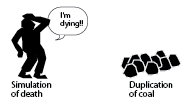Some simulations are duplications
Some simulations lack essential features of the object simulated—eg theatrical death vs real death. Others capture the essential features despite being produced in nonstandard ways—eg artificial coal. The latter are duplications: the former are not.

The Copeland argument
"Call a simulation a simulation-1 if it lacks essential features of whatever is being simulated. Thus simulated death is a simulation-1 of death because the person involved is still living, and simulated leather is a simulation-1 of leather because it is composed of the wrong sorts of molecules. Call something a simulation-2 if it is exactly like whatever is being simulated except that it hasn't been produced in the usual way but by some non-standard means, perhaps under laboratory conditions. Thus some coal produced artificially in a laboratory may be called simulated coal even though it is absolutely indistinguishable from naturally occurring coal. The world 'simulated' here indicates nothing more than that it is artificial coal: it didn't come out of the ground...It is, then, only half true that a simulated X is not an X: a simulated-1 X is not an X, but a simulated-2 X is an X" (Copeland, 1993, p. 47).
"The answer to the simulation objection is not straightforward. The objection assumes, with no argument whatsoever, that computer simulations of thinking will always be mere simulations, never the real thing. Putting this in simulation-1/simulation-2 terminology, the objection assumes without argument that no matter how good computer simulations of thinking become, the simulation must always be described as being of type 1, never of type 2. However, our central question of whether a computer could think asks precisely whether a computer simulation of thinking could be a simulation-2. Thus the simulation objection simply prejudges the central issue, and so is without interest" (Copeland, 1993, p. 47).
Source: Copeland, Jack (1993) Artificial Intelligence: A Philosophical Introduction. Oxford: Blackwell.